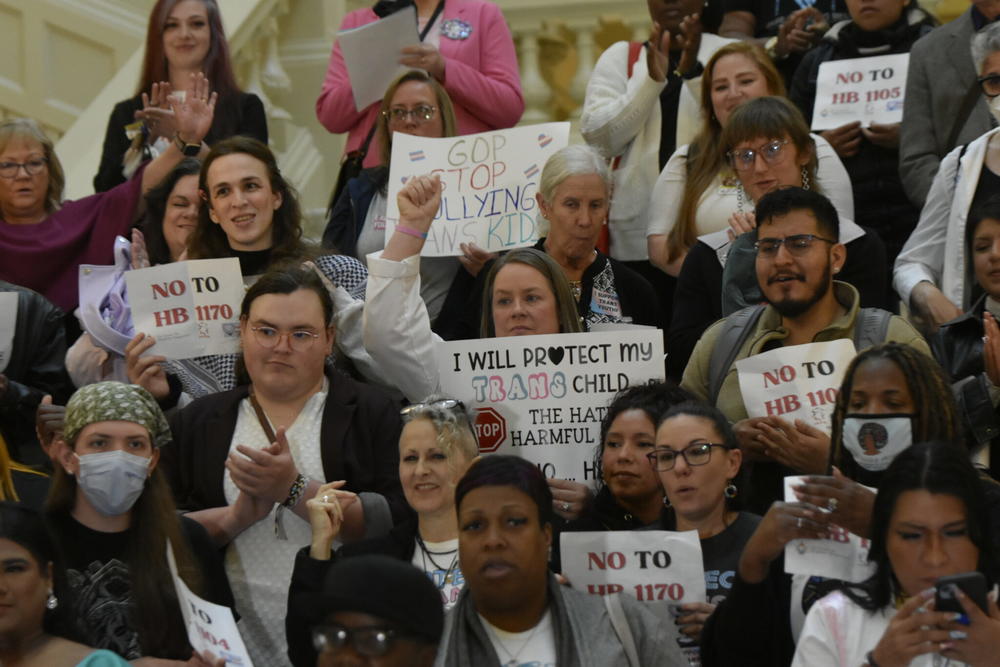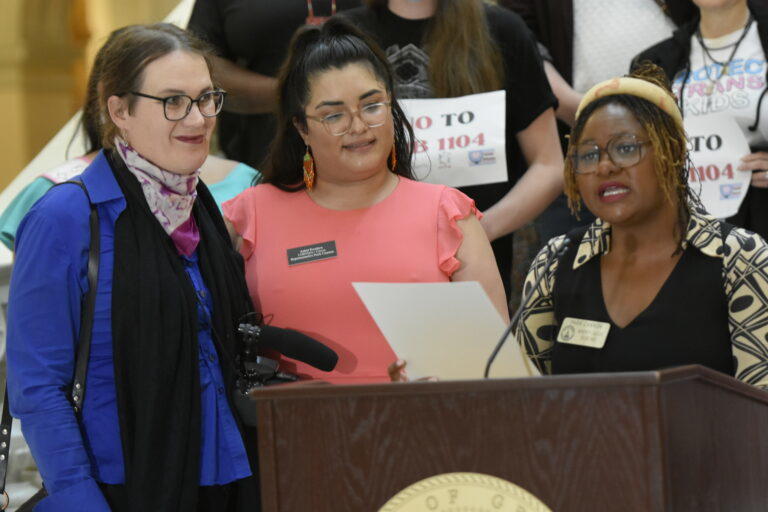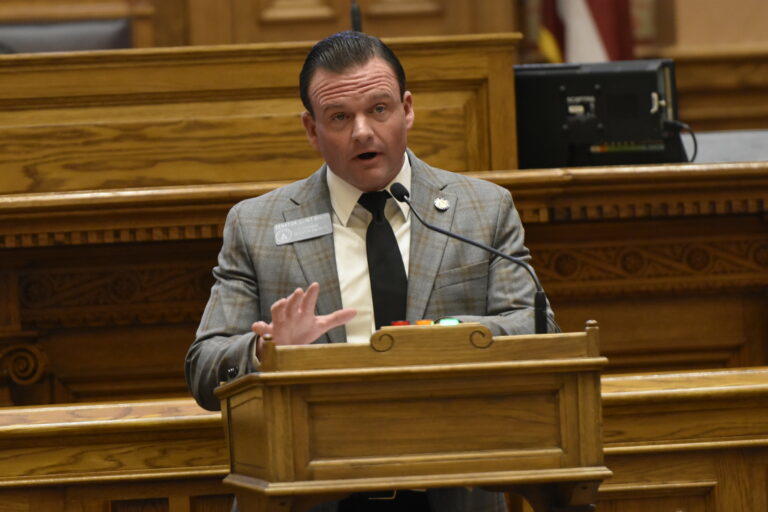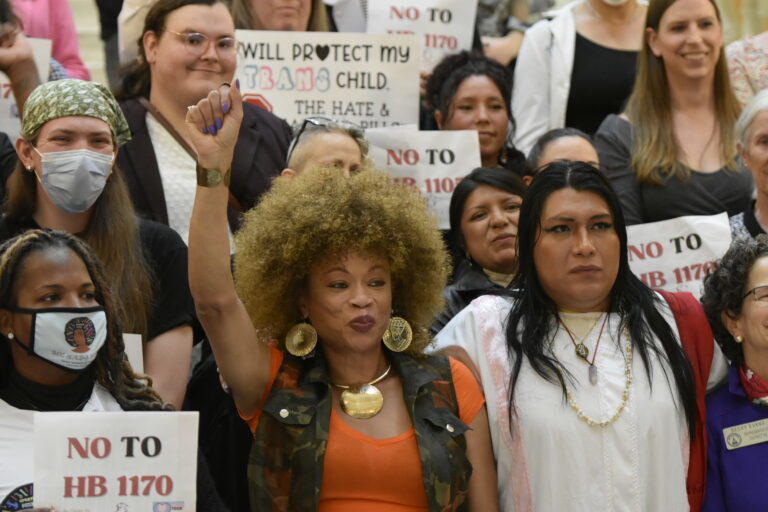
Caption
A pro-trans crowd gathers at the Georgia Capitol ahead of a Senate vote on an anti-trans bill.
Credit: Ross Williams / Georgia Recorder

A pro-trans crowd gathers at the Georgia Capitol ahead of a Senate vote on an anti-trans bill.
Transgender Georgians and supporters gathered in downtown Atlanta Tuesday to mark the second annual transgender liberation day at the state Capitol, hours before the state Senate passed legislation on party lines banning transgender children from playing sports and using restrooms aligning with their gender identity as well as several other conservative priorities.
“There’s this narrative out there that there are no trans kids and that it’s something that people choose to be later,” said Kalie Hargrove, a pastor and transgender woman. “It’s a complete myth. Trans kids exist. I know because I was one, when I was going through puberty, I didn’t even live in a place where I had the language to explain my experience, what I was feeling.”
Hargrove spoke with the Recorder after dozens gathered on marble steps inside the Capitol, some holding signs saying “vote no on HB 1104” or pink, blue and white transgender pride flags.

Darlene Wager (left), wife of transgender pride flag designer Monica Helms, accepts a resolution honoring Helms.
Several Democratic and LGBTQ lawmakers in the House sponsored a resolution honoring Monica Helms, who designed the iconic trans pride flag in 1999, a year before moving to Atlanta. Helms’ wife, Darlene Wagner, accepted a copy of the resolution in her honor.
But much of the event was overshadowed by fear of the coming Senate vote.
“The life of being trans in the world today, it means going against so much in our media, so much in our politics that just wants to tell us that we shouldn’t exist, that we’re some type of mental illness, we are some type of groomer or pedophile,” Hargrove said.
Shortly afterwards, the Senate passed Decatur Democratic Rep. Omari Crawford’s House Bill 1104, originally a bill intended to bolster the mental health of student athletes but amended in Senate committee to include the transgender bans as well as a bill eliminating sex education in schools before sixth grade and charging school districts with creating policies to notify parents each time their child checks out materials from the school library.
Conservatives touted the bill as a major new protection for Georgia girls.
“Georgians overwhelmingly support saving girls’ sports, protecting the privacy of our daughters in bathrooms and changing rooms, and preserving the innocence of our children,” said Cole Muzio, president of the conservative Frontline Policy Action lobbying group. “Hyperbolic statements and partisan rhetoric will not distract from the simple reality that this is something our citizens both want and deserve.”
Crawford said he can no longer support his own bill.
“The legislation that I drafted was meant to help student athletes, meant to help students,” he said. “And with a lot of the provisions that were added in there, it would do just the opposite. So in a very terrible, ironic sense, my bill was to prevent suicide. I don’t think that this bill does that now.”
According to the American Psychological Association, bills and laws targeting transgender children have resulted in “heightened levels of anxiety, depression, and suicide risk among the transgender community.”

Sen. Clint Dixon
Senate Education and Youth Committee Chair Sen. Clint Dixon, a Gwinnett Republican, said he was concerned with the mental health of female athletes who lose to their transgender opponents.
“Yeah, no, I disagree with that,” he said. “I mean, what about females? We need to protect females and the sanctity of their playing their sports. If males want to play sports, they need to play it with males.”
Jennifer Hadley, a mom of a transgender son from Bethlehem, said she is trying to figure out what the bill would mean for her son, a member of the school marching band. She said she doesn’t know what will happen if, for example, he needs to change into his uniform to play at an away football game.
“I have not been able to get an answer from the senators that I’ve spoken with,” she said. “We haven’t gotten any forthcoming information on how it’s going to impact them. And that’s scary.”
“He feels targeted and picked on because they’re already trying to figure out how to make it all work, they being the school and the peers, the teachers, the counselors already. And my kid’s trying to figure out how to grow up,” she said. “And to just have these layers makes it hard. I think kids are very resilient, and I feel like my son’s doing a better job than I am.”
Atlanta Democratic Sen. Elena Parent called Dixon hypocritical for a provision of the bill requiring school districts to take public comment for at least 45 days before approving sex ed curriculum.
“Well, this bill popped up in committee with no notice, no 45 days, no opportunity for review, no opportunity for public input, and it wasn’t even online by the time we were voting on it,” she said. “So I cannot believe that no one but me in this chamber thinks that it is outrageous that we are busy mandating these things for school boards across the state while behaving in the complete opposite way. It betrays a lack of respect for voters to operate that way. It betrays a lack of seriousness about the jobs that we should be trying to do to fully vet legislation.”
The bill could now head back to the House in time for the final day of the Legislative session on Thursday.
Shortly after the Senate vote, Crawford said he’s not sure what the House will do.
“I’m hoping that it’s something that we don’t take up on the floor,” he said. “You know, I don’t know. I don’t know. At this point, I’m just trying to figure it all out.”
The Senate could take up a separate bill banning puberty blocking medication for transgender minors that was tacked on to legislation that would put overdose reversal drugs in government buildings.

Tracee McDaniel
But later Tuesday night, the House moved forward with a bill containing the opioid reversal language without the puberty blocker ban, a potential indication the House does not plan to pass the puberty blocker bill.
Speaking to a crowd on the Capitol steps, Atlanta trans advocate Tracee McDaniel said the trans community will come out in force at the ballot box and will continue to pressure lawmakers.
“When it comes down to it, if the legislation doesn’t include transgender non-conforming, non-binary people, then it doesn’t matter, because we matter,” she said. “We’re resilient. We’re not going anywhere. I’m wearing my fatigues today, honey, and I’m ready to fight. I’m ready to show up and I’m ready to show out. So always remember, no matter what nobody tell you, human rights are trans rights, trans rights are human rights.”
This story comes to GPB through a reporting partnership with Georgia Recorder.